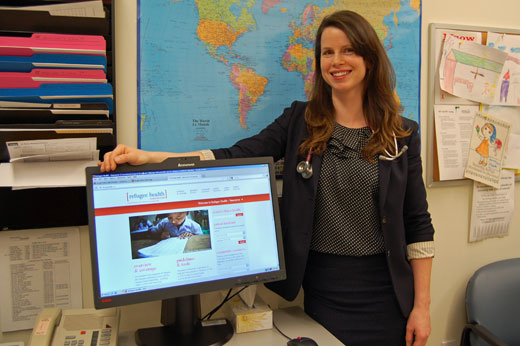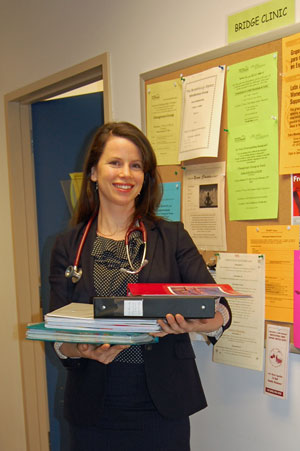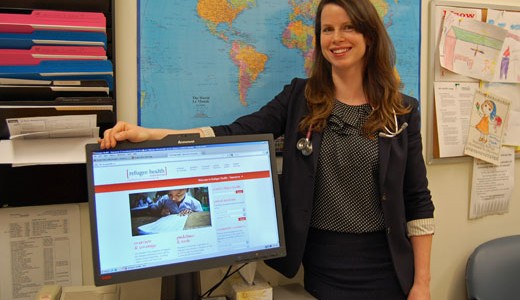New website opening health care doors for refugees

Dreaming big: In the future, Dr. Scholtens would like to expand refugeehealth.ca to benefit refugees across Canada.
Dr. Martina Scholtens is a proud mother of four children, and refugeehealth.ca is her brainchild. While on maternity leave last year, the expert in refugee care built this one-of-a-kind website to open more health care doors for this unique population.
“I love my job,” says Martina, who works out of Vancouver’s Bridge Clinic. “I learn something new every day, and it’s very satisfying work.”
The Bridge Clinic sees approximately 1,600 new patients annually, sometimes within days of arrival to Canada. It’s designed to provide primary care services while refugees settle in to their new lives; after a year, the goal is to transition patients to a family physician in the community. And that’s the challenge.
“Many GPs don’t accept refugee patients because they’re unfamiliar with their specific needs or they’re unsure how to get paid for treating them,” Martina explains.
Better understanding leads to better care
What make Martina’s work so interesting – patients from far-flung countries, speaking a myriad of languages and presenting unusual conditions – are what make it so difficult for refugees to find a family doctor.
“We often see things here, like parasites, that GPs don’t usually see,” says Martina, “and we see people who sometimes come to us from traumatic backgrounds.”
How, Martina wondered, could we give GPs the information and confidence to serve this population? The answer, of course, is refugeehealth.ca. The site contains practical and popular patient handouts translated into multiple languages, and so much more.

Saving trees and time: refugeehealth.ca replaces Bridge Clinic files and binders, eliminating wasted time and frustration trying to find resources to serve patients.
“If I had a Bhutanese family who’d been refugees in Nepal since the 1980s,” says Martina, “I could look up their cultural profile on the site to understand the political and medical issues.
“I would learn that Vitamin B12 deficiency is common because refugee camps only serve meat every second week, so I’d screen for that in their blood work. I could go to another section of the site to see if the vitamin supplements are covered and find a source for them.”
Dr. Patricia Gabriel of Port Coquitlam’s Medical West family practice uses the website regularly. As a UBC primary care researcher, she also conducts research in refugee health.
“I find the country background information particularly helpful for walk-ins or new patient relationships,” she says. “Gaining a better understanding of my patient’s cultural context and migration history helps us provide appropriate care.”
Dreams of going Canada-wide
Martina developed the site with the aid of a grant from the B.C. College of Physicians, the services of a professional web developer and the support of student and Resident volunteers. Maintaining the B.C.-oriented site is an ongoing job for which she’s grateful to have the help of her Bridge Clinic colleagues and friends.
More than 3,700 visitors have referred to the site so far, and as many as 500 of these visitors are regular users.
“As physicians learn about the site, we expect to gain visitors and, over time, more GPs will accept refugees as patients,” she says.
“In the future, I’d love to expand the site to include information for each province, and benefit refugees across Canada.”

